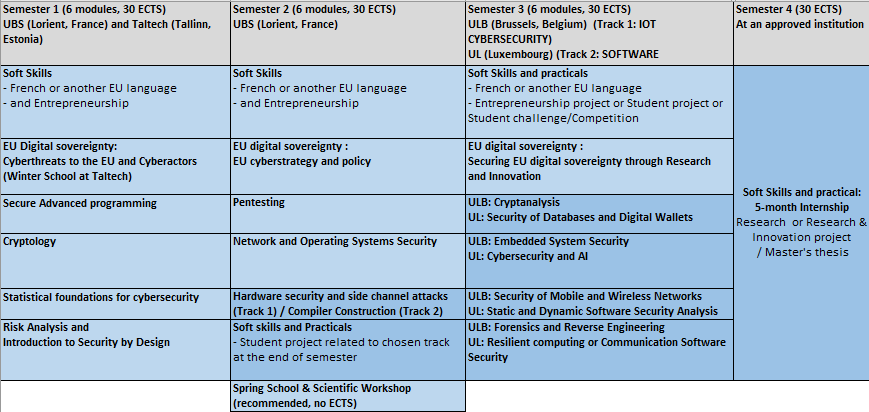
The CYBERUS Erasmus Mundus Joint Master in cybersecurity, or CYBERUS, is a highly integrated two-year full-time master programme. It is taught in English. It offers 2 specialisation tracks leading to double master’s degrees:
Students enrolled in the IoT Cybersecurity track receive a double master’s degree from UBS and ULB while those registered in the Software Cybersecurity track receive a double master’s degree from UBS and UL. A balance is targeted in the number of students in either specialisation.
The study plan is the following:

For more details, you can downlload the CYBERUS Syllabus 2025.
The vast majority of taught modules are technological (over 70%). Some are common to all students: Secure Advanced Programming, Cryptology, Network and Operating Systems Security, Statistical Foundations for Cybersecurity, Risk Analysis and Introduction to Security by Design, and Pentesting.
Student in the IoT Cybersecurity track will additionally study: Hardware Security and Side Channel Attacks; Protocols, Cryptanalysis and Mathematical Cryptology; AI + Machine Learning for Security; Security of Mobile, Wireless and IoT Networks; and, optionally, Frameworks for the Management of Security or Quantum Computation and Cryptography or Forensics or Advanced Digital Architectures.
Student in the Software Cybersecurity track will additionally study: Compiler Construction; Security of Databases and Blockchain Software; AI and Cybersecurity; Static and Dynamic Software Security Analysis; and, optionally, Resilient Computing or Software Defined Network Security.
TalTech (Estonia) teaches the compulsory Winter School. It is called “The Cyberlandscape: Cyberthreats and Cyberactors“. The course examines the role of cyberspace as a domain of operations for state and non-state actors. This was acknowledged by NATO in 2016 and is now regarded as an equal to operations on land, sea, air and space.
The programme combines teaching and training. The final 5-month internship is a training period when students show their ability to bring together and perfect acquired skills, carry out a research or industrial project, formalise original thinking through a master's thesis, keep acquiring new skills and hands-on experience and prepare for a future job in research, innovation or consultancy.
Students can additionally do a 6-week internship in semesters 2 and 3.
In projects, students will have to work collaboratively in groups of 2 to 4 on specific topics. Projects will lead students to connect all their acquired knowledge and to develop social skills.
Students across current cohorts will be encouraged to take part in international cybersecurity challenges such as “Capture the Flag” (CTF), “Embedded Security Challenges” or hackathons organised, for example by UBS students and staff, the consortium’s associated partner Forum International de la cybersecurity (Lille, France) or by CSAW (CyberSecurity Games and Conferences), etc. They require students to work as a team, act fast, make the right decisions, and solve challenging problems by bringing together skills and knowledge. Such competitions further add to the expertise and practical know-how required in the IT/IoT industry and academia.
CYBERUS students will need to speak two EU languages at least: the language of tuition, English, and French. While instruction and professional work are conducted in English as a common denominator, students will be actively engaged in French-speaking environments beyond their learning settings. It is expected that few will speak French initially. This is why all will have to take French in every taught semester, or another language if they already speak it. For other EU languages, CYBERUS students will enjoy the same offer as that to international students built along the same lines of level achievement at the end of each semester, of student progression, and of development of linguistic, communicational, and cultural skills. This will accompany the development of intercultural skills.